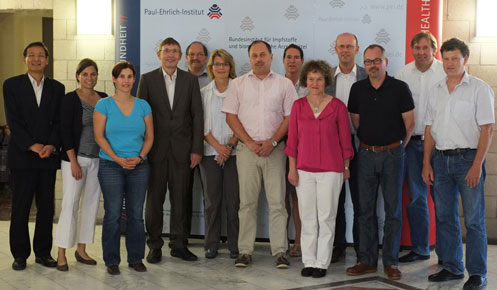Effective vaccines world-wide: WHO designated a collaborating centre for vaccines at the Paul-Ehrlich-Institut in Langen near Frankfurt/Main
07 / 2013 (Translation German Press Release of 11 September 2013)
Joint Press Release German Federal Ministry of Health and Paul-Ehrlich-Institut.
A WHO Collaborating Centre for Vaccines (WHO-CC) was designated by the World Health Organization (WHO) at the Paul-Ehrlich-Institut in late August 2013. The Paul-Ehrlich-Institut’s experts of the "WHO Collaborating Centre for the Standardization and Evaluation of Vaccines", together with international partners, will support the WHO in developing and implementing international norms and standards in the next four years. The WHO-CC will base its work on the vision of the "Decade of Vaccines" – the vision of a world in which all humans have equal access to safe and effective vaccines.
The German Federal Minister of Health, Daniel Bahr, explained: "Vaccination is the best protection against infectious diseases. We are therefore committed to the provision of safe and effective vaccines nationally and internationally. I am pleased that with this designation, the WHO recognises the important role of the Paul-Ehrlich-Institut’s experts at an international level."
Dr Michael Pfleiderer, from the Division of Virology, is head of the WHO CC for Vaccines. He and other scientists from the Divisions of Virology and of EU Co-operation/ Microbiology, which are both responsible for the evaluation of vaccines, will be working on 16 work packages. The Paul-Ehrlich-Institut will focus on the following areas:
- Development of effective vaccines against emerging infectious agents with pandemic potential: Creating a basis for rapid provision of vaccines by anticipating regulatory needs.
- Evaluation of innovative vaccines for the prevention of infectious diseases: Establishing standards for new technologies in vaccine production and control.
- Protection of humans in the remotest areas of the world from dangerous pathogens: Developing conditions for safe provision and application of vaccines.
The new WHO-CC for vaccines at the Paul-Ehrlich-Institut will support the WHO in the field of vaccines and strengthen the successful cooperation. The fight against and eradication of dangerous infectious agents by more vaccinations are objectives of the underlying "Global Vaccine Action Plan" which was endorsed by the World Health Assembly in May 2012. Germany supports both this plan and the eradication of the measles planned for 2015. "The high number of measles infections in Germany this year shows however that there is still need for action"
, said the German Federal Minister of Health, Daniel Bahr. "First results from a current survey by the Emnid Institute on behalf of the Federal Ministry of Health show that almost 80percent of respondents no longer consider measles as a harmless childhood disease".
Professor Klaus Cichutek, president of the Paul-Ehrlich-Institut, explained the remit of the WHO CC: "The Paul-Ehrlich-Institut is recognised world-wide for its expertise in the field of vaccines. Infectious diseases threaten the progress and welfare of people all over the world. In collaboration with the WHO, our WHO CC will create the regulatory basis for the introduction and further development of safe and effective vaccines."
 The staff of the WHO Collaborating Centre for Vaccines, including Dr Michael Pfleiderer (centre) and Professor Klaus Cichutek (fourth from left).
Source: PEI
The staff of the WHO Collaborating Centre for Vaccines, including Dr Michael Pfleiderer (centre) and Professor Klaus Cichutek (fourth from left).
Source: PEI
The Paul-Ehrlich-Institut's expertise and experience in scientific and regulatory advice related to the development of vaccines is particularly important for the WHO. In 2011, for example, sudden reports from research indicating a contamination of rotavirus vaccines with foreign DNA were reviewed speedily and extensively. Research results by the Paul-Ehrlich-Institut could rule out a hazard to human health. Nevertheless, regulatory action will lead to a removal of the contamination.
Press Contact:
Paul-Ehrlich-Institut
Press Office
Dr. Susanne Stöcker, Dr. Corinna Volz-Zang, Brigitte Morgenroth
Paul-Ehrlich-Straße 51-59
63225 Langen
GERMANY
Telefon: +49 6103 77 1030
Telefax: +49 6103 77 1262
Email: presse@pei.de
The Paul-Ehrlich-Institut, the Federal Institute for Vaccines and Biomedicines, in Langen near Frankfurt/Main is a senior federal authority reporting to the Federal Ministry of Health (Bundesministerium für Gesundheit, BMG). It is responsible for the research, assessment, and marketing authorisation of biomedicines for human use and immunological veterinary medicinal products. Its remit also includes the authorisation of clinical trials and pharmacovigilance, i.e. recording and evaluation of potential adverse effects.
Other duties of the institute include official batch control, scientific advice and inspections. In-house experimental research in the field of biomedicines and life science form an indispensable basis for the manifold tasks performed at the institute.
The Paul-Ehrlich-Institut, with its roughly 800 members of staff, also has advisory functions nationally (federal government, federal states (Länder)), and internationally (World Health Organisation, European Medicines Agency, European Commission, Council of Europe etc.).



